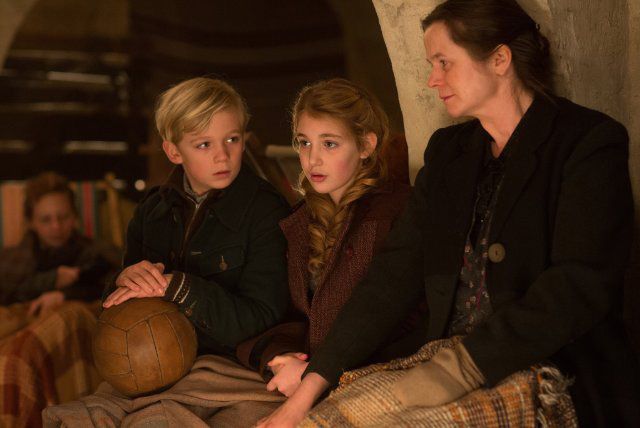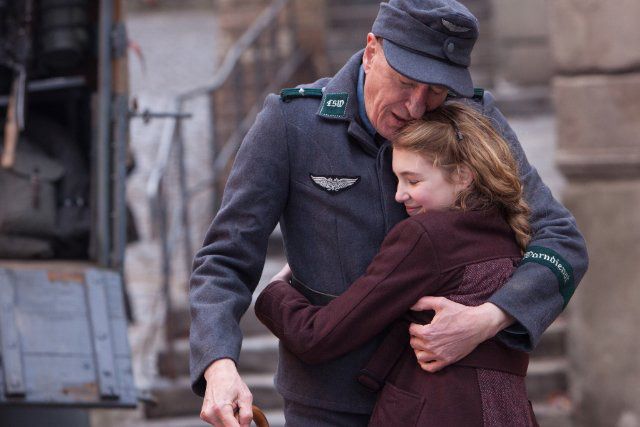The Book Thief: The Nazis and the assault, then and now, on culture
By Joanne Laurier, wsws.org

Directed by Brian Percival; screenplay by Michael Petroni, based on the novel by Markus Zusak
On November 9, 1938, the Nazi regime organized the Kristallnacht (Night of Broken Glass) pogrom in Germany and Austria, initiating open, state-sanctioned mass violence against Jews, which escalated thereafter rapidly and culminated in the Holocaust. The nationwide pogrom in November 1938 involved the mass destruction of Jewish businesses and synagogues. Some 30,000 German Jews were thrown into concentration camps and hundreds were murdered. This year marks the 75th anniversary of the tragic event.
British director Brian Percival’s movie The Book Thief deals in part with the horrors of the Kristallnacht period and is an effective reminder of the impact of Nazi atrocities on everyday life. In general, it focuses its attention on the Hitlerite attempt to destroy culture.
Based on Australian author Markus Zusak’s international bestseller, the movie—like the novel—is narrated by Death (the voice of Roger Allam), who admits, smacking his lips, in the film’s opening sequence that Germany of the 1930s and 1940s was a busy time for him: “I make it a policy to avoid the living … well, except sometimes I can’t help myself … I get interested … Liesel Meminger caught me … and I cared.”
Liesel (Sophie Nélisse), on the verge of adolescence, is traveling with her mother and younger brother on a train when her sibling takes ill and dies. The purpose of the journey is to finalize the adoption of the children before their mother is sent away to an unknown fate, as a Communist. At her brother’s gravesite, Liesel absconds with a book, The Gravedigger’s Handbook (literally that), a treasure for the illiterate girl.
[pullquote]Clearly, the movie The Book Thief is arguing that culture is the antidote to fascist barbarism. But how was it possible in a country such as Germany with one of the richest cultural histories in the world that a crowd of gangsters took power and carried out unparalleled crimes? Artists and filmmakers have a hard time, especially at present, explaining concretely the conduct of various social and political tendencies and their consequences.[/pullquote]
Liesel’s foster parents prove to be the poverty-stricken Hubermanns—Hans (Geoffrey Rush) and Rosa (Emily Watson), residing in a small working class town. The kindly Hans, a housepainter economically punished for refusing to join the Nazi party, has an immediate affinity for the traumatized girl, while Rosa at first only appears to be interested in the stipend that comes with Liesel’s care.
Taunted by a school bully for her inability to read, Liesel quickly overcomes her handicap with Hans as her tutor and the dank basement walls of the Hubermann house as a dictionary blackboard. The Gravedigger’s Handbookis the only available reading material. Nonetheless, mastering the book generates in Liesel an insatiable passion for reading. Meanwhile, she develops a close friendship with a young neighbor and classmate, Rudy Steiner (Nico Liersch), a sweet, bony-legged athlete whose idol is African American track star Jesse Owens, winner of four gold medals at the 1936 Olympics in Berlin. Rudy’s enthusiasm for Owens has him applying black paint to his body, which opens him up to racialist ridicule and abuse.
A horrified Liesel is forced to participate in a local Nazi-organized book burning ceremony (“The end of communism and Jews”). As the fire dies down and the crowd disperses, Liesel rescues a half-burned book, an act witnessed by the burgomaster’s wife, Ilsa Hermann (Barbara Auer), who employs Rosa to launder. The Hermann mansion has a huge library assembled by Ilsa’s now-deceased son, for whom she is still grieving. One day when Liesel is delivering laundry, Ilsa invites her into the library. The girl spends many magical afternoons thereafter devouring the room’s contents. Ilsa sees something of her dead son in Liesel, but her intolerant husband, the village’s leading Nazi, throws Liesel out, cutting off a source of much-needed income for the Hubermanns.

As the attacks on the Jews escalate, an ailing Jewish teenage fugitive, Max (Ben Schnetzer), seeks shelter with the Hubermanns. The boy’s father saved Hans’ life in World War I, bequeathing to him an old accordion, which Hans frequently plays for solace. Hans, despite the enormous dangers involved and the hardship of having another mouth to feed, takes Max in. Liesel and Max form an intense bond, the former nursing the latter back from near death by reading books she surreptitiously “borrows” from the Hermann’s library. (Max: “The only difference between us and a lump of clay is life—words are life.”) When Rudy learns the truth about Liesel’s book-thieving escapades, they form a juvenile anti-Hitler pact. The onset of World War II brings much tragedy and suffering to the Hubermann’s community, but books for Liesel retain their transcendental powers.
As a tale about the crimes of Nazi Germany, The Book Thief is well served by the moving performances of Rush and Watson. Nélisse as Liesel is extraordinarily convincing as the young protagonist, bolstered by her energetic side-kick Rudy and her dignified mentor Max. A sentimental score by John Williams accompanies a storyline that is a somewhat lacking in dimension. However, the film’s striking, clear images speak to an important level of care and commitment on the part of its makers. This makes itself felt, for example, in the jarring contrast between Liesel’s and Rudy’s innocent, almost angelic visages and the reprehensible Hitler Youth uniforms they must sport.
Laudably, The Book Thief ‘s main theme is the need to defend culture, a subject of the greatest urgency in the present political situation. As a whole, however, the movie’s value in sensitizing the population to the dangers of authoritarianism and fascism is limited to encouraging a general humanity and sympathy. And it provides only vague answers to the question as to why the Nazis burned books.
Hitler once boasted: “I want a brutal, domineering, fearless, cruel youth. Youth must be all that. It must bear pain. There must be nothing weak and gentle about it. The free, splendid beast of prey must once again flash from its eyes … That is how I will eradicate thousands of years of human domestication … That is how I will create the New Order.”
Clearly, the movie is arguing that culture is the antidote to this savage conception. But how was it possible in a country with one of the richest cultural histories in the world that a crowd of gangsters took power and carried out unparalleled crimes? Artists and filmmakers have a hard time, especially at present, explaining concretely the conduct of various social and political tendencies and their consequences.
How many filmmakers, in Germany or elsewhere, would be familiar with the revolutionary opportunities that existed in Germany between 1918 and 1933, whose betrayal and failure opened the door to Hitler’s movement? “Communism” is mentioned a few times in The Book Thief as the nemesis of fascism, but the filmmakers make no effort to associate the rise of fascism with the intractable crisis of German capitalism. The Nazi assault on books and culture was an element of their assault on socialist consciousness and the working class. Then as now, reaction correctly identified culture and knowledge with dangerous opposition to its operations.
In his brilliant 1933 article “What is National Socialism?” Trotsky, whose books were among those burned by the Nazis that same year, wrote: “The bonfires which burn the impious literature of Marxism light up brilliantly the class nature of National Socialism,” adding that the Nazis’ special political art “consisted in fusing the petty bourgeoisie into oneness through its common hostility to the proletariat.” And further: “Everything that should have been eliminated from the national organism in the form of cultural excrement in the course of the normal development of society has now come gushing out from the throat; capitalist society is puking up the undigested barbarism. Such is the physiology of National Socialism.”
Five years later, Trotsky, André Breton and Diego Rivera collaborated on a manifesto that began, “We can say without exaggeration that never has civilization been menaced so seriously as today. The Vandals, with instruments which were barbarous and comparatively ineffective, blotted out the culture of antiquity in one corner of Europe. But today we see world civilization, united in its historic destiny, reeling under the blows of reactionary forces armed with the entire arsenal of modern technology.”
It seems likely that by dramatizing the Nazis’ “holocaust of books” the makers of The Book Thief are responding, with whatever degree of consciousness, to present-day censorship and attacks on culture. At its best, the movie brings forward the heritage of the likes of poet John Milton, whose books were publicly incinerated in England and France, and who wrote in 1644 that “Anyone who kills a man kills a reasonable creature, God’s image; but he who destroys a good book kills reason itself.” The great German poet, and friend of Karl Marx, Heinrich Heine prophetically wrote in his 1821 play,Almansor: “Where they burn books, so too will they in the end burn human beings.”
More recently, in the introduction to the 1967 edition of his Fahrenheit 451, science fiction writer Ray Bradbury recalled about the time of the Nazi actions: “I ate, drank, and slept books … It followed then that when Hitler burned a book I felt it as keenly, please forgive me, as his killing a human, for in the long sum of history they are one and the same flesh. Mind or body, put to the oven, it is a sinful practice, and I carried that with me.”